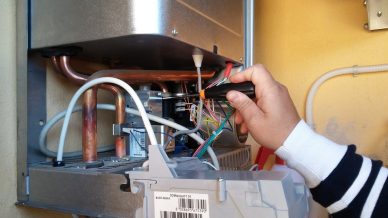A boiler is arguably the single most important home appliance in a part of the world that gets as bitterly cold as the UK. A boiler’s basic principle is to transfer heat to water. In essence, it works by heating water, which then pumps throughout your house. However, this is just a rudimentary description of how boilers work. The inner workings can get so much more complex when you look at different types of boilers.
In this blog, we will explain how different types of boilers work. But first, let’s discuss the operation process shared by all boilers. So hoe
The Boiler Process
- When your home’s thermostat detects a drop in temperature, it triggers the boiler.
- Your boiler turns on and heats your home using either oil, gas, or electricity.
- The heat emitted by the fuel source is used to heat the water inside the boiler.
- The heated water or steam circulates throughout your home (via radiators or radiant floor systems), where it emits heat to warm the ambient air.
- As the water cools (or the steam condenses), it returns to your boiler to reheat before being sent back out to continue heating your home.
- This process repeats until your home reaches the desired temperature and your thermostat calls for the boiler to turn off.
Different Types of Boilers
As previously stated, a boiler must first generate heat (during the “combustion process”) before it can transfer heat to water. However, different boilers generate that heat using different fuel sources.
A boiler generates heat by burning one of these three fuel sources:
Gas boilers
When a gas boiler receives a call from the thermostat, it ignites gas and oxygen within a “combustion chamber” to generate heat. The heat from the burning gas warms up the “heat exchanger”—a web of copper piping that transfers the heat to water. Gas boilers are the most common type of boilers in the UK and are typically less expensive to install and run than oil and electric boilers.
Oil boilers
Oil boilers work in much the same way as gas boilers: they convert oil fuel into heat inside the combustion chamber, heating the heat exchanger, which then heats the water. The main distinction between oil and gas boilers is fuel management—an oil boiler requires the installation of an oil storage tank, and the oil must be delivered to the home and stored in the tank until used. Oil boilers are not as environmentally friendly as gas burners, but they can be more efficient depending on the model. Despite fluctuations in oil and gas prices, oil boilers are typically more expensive to run than gas boilers.
Electric boilers
Electric boilers are often used in homes that do not have access to a gas line. An electric boiler generates heat by heating elements with electricity rather than burning fuel to heat the water. While electric boilers burn “cleaner,” they are less efficient and cost more to run than oil or gas boilers.
Understanding how a boiler works will help you work out what went wrong if your boiler breaks down unexpectedly.
If you would like to find out more you can contact us.
